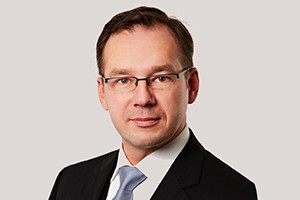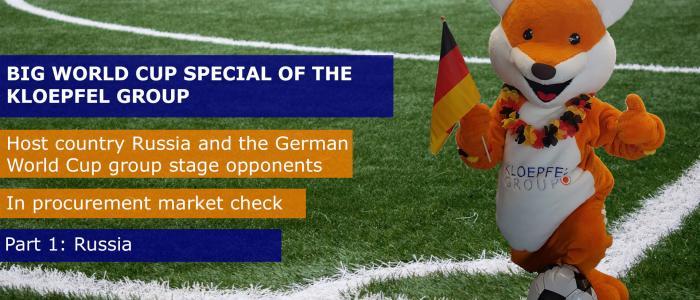Procurement market Russia – The host country of the World Cup in the check
On June 14, it’s finally time again – the World Cup begins. For this major sports event, the Kloepfel Group is taking a closer look at the procurement markets of Germany’s preliminary rounds opponents and the host country Russia. In the first part of our World Cup Special, you will find out what makes up the procurement market in the host country, what needs to be considered and which markets are particularly interesting.
Procurement in the largest country in the world
There is so much to discover in Russia: also for procurement. With 17.1 million square kilometers, Russia is the world largest country and thus offers numerous opportunities for procurement. Since 2015/2016, the country is in recession. The main reasons for this are the very low oil price, the collapse of the ruble, the Western sanctions due to the Ukraine crisis and the high inflation rates of more than 10 percent. The Russian economy is gradually recovering, but many sectors – above all the automotive and mechanical engineering sectors – still have spare capacity. They are looking for new customers who will restart production. The advantages for non-Russian companies are technical resources with high-quality which meet the most modern demands. The improvements in terms of production capacity and quality in recent years make Russia particularly attractive as a procurement market.
The latest rising export and import figures show that the economic situation is gradually improving: in 2017, the country imported goods worth around 238 billion US dollars and exported goods worth around 353 billion US dollars. Germany plays a major role for Russia in both exports and imports. In 2016, Germany was ranked third among the most important export countries (7.8 percent), after China (10.3 percent) and the Netherlands (10.5 percent). Among the most important import countries, Germany was even ranked second with 11 percent (2016). Only from China the World Cup host imports more (21.6 percent).
Raw materials, sanctions & purchasing initiatives
Russia is a country rich in raw materials: around 16 percent of all the world’s mineral natural resources are in Russia. The most important resources include natural gas, crude oil, coal, gold, iron & tin, nickel, copper, cobalt, lead and zinc. This is also noticeable in the leading industrial sectors. The mechanical engineering, ferrous and non-ferrous metals processing, chemical and petrochemical industries as well as the wood and food industry are particularly strong.
But be careful! Since 2014, economic sanctions against Russia have been in force because of Russia’s annexation of the Crimean peninsula in the port city of Sevastopol. Some products are on the sanctions list, others are subject to high tariffs. This applies above all to the food industry, but the export of mechanical engineering and automotive parts is easier. Nevertheless, you should remember 31 July 2018, when the sanctions expire. Whether these will be extended again will become apparent in the course of the next few weeks. As a countermeasure, the Russian government has also imposed an import ban on agricultural products, raw materials and food. Although these have been relaxed, they have been extended until 31 December 2018.
Only recently, the BME announced that they would continue to drive forward the “Russia Purchasing Initiative”. Together with the Eastern Committee of German Economy and the German Foreign Chamber of Commerce Russia, the initiative is intended to support Russian suppliers of goods and services and to integrate them more strongly into the international supply chain with German assistance.
Air, rail or water: Logistics in Russia
If you are dealing with the idea of exploiting the Russian procurement market, the main industrial locations such as the Moscow region, the Volga region, the northwest and the Urals are interesting. The machine and vehicle industry as well as the equipment and plant construction industry are strongly represented here.
Most of these regions are home to well-known logistics companies operating worldwide. The quality of road networks has improved considerably in recent years, so that binding transit times can also be expected in the road transport sector. The only obstacles to be overcome locally are customs formalities. These can differ greatly from the region of the sender or recipient and from the type of goods that are transported. It is advisable to leave customs clearance and transport completely to a logistics company in order to avoid delays in transit times.
Russia as a consumer market
In recent years, Russia has imposed an import ban on all product groups and individual articles in response to Western sanctions. These should be produced on the local market. This was and remains a good way to get many Western investors to support the construction of the production plant and facilities in Russia. A considerable proportion of industries and sectors can count on very attractive state subsidies for such development steps. Of course, a careful examination of all legal and local conditions is absolutely necessary when planning these steps.
Conclusion
For European companies, the procurement market of the host of the World Cup is quite interesting and offers a lot of potential. However, you should consider a few points in advance, such as logistics, customs duties and contacting potential, qualified suppliers. Here it can be helpful to obtain expertise from experts in advance in order to avoid unexpected surprises.

Dimitri Lagun
About the Author
Dimitri Lagun is an expert in purchasing and procurement in Russia. As Senior Manager at Kloepfel Consulting, he is responsible for Russia consulting.
Would you also like to benefit from the know-how of our expert? Then feel free to contact us at 49 211 875 453 23 or at info@kloepfel-consulting.com.
Part 2: Procurement Market Mexico – More than just Siesta!
Part 3: Procurement market Sweden – How strong is our preliminary round opponent?
Part 4: Procurement market South Korea – The opponent of the World Cup in the check
Part 5: Procurement market Switzerland – Our neighboring country in check
Part 6: Procurement market Brazil: Is everything sweet in the land of the Sugarloaf Mountain?



Comments are closed.